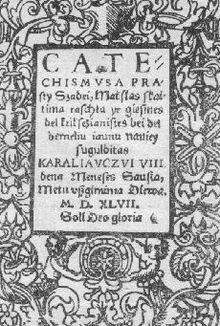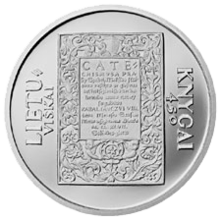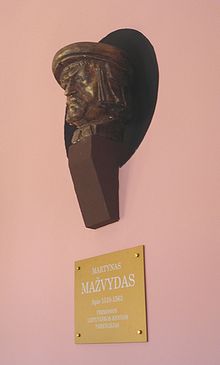- Martynas Mažvydas
-
 The First Lithuanian printed book The Simple Words of Catechism (1547)
The First Lithuanian printed book The Simple Words of Catechism (1547)
Martynas Mažvydas (1510 near Žemaičių Naumiestis (now in Šilutė district municipality) - May 21, 1563 in Königsberg (now Kaliningrad) was the author and the editor of the first printed book in the Lithuanian language.
Variants of his name include Martinus Masvidius, Martinus Maszwidas, M. Mossuids Waytkūnas, Mastwidas, Mažvydas, Mosvidius, Maswidsche, and Mossvid Vaitkuna.
Contents
Biography
Mažvydas was a prolific 16th century Lithuanian author, who is associated with the beginnings of Lithuanian literature. He was of Samogitian origin, born in the Grand Duchy of Lithuania; his parents were said to be indigent townspeople. Mažvydas spent his youth in Vilnius, where he worked together with other pioneering Lithuanian authors from the Grand Duchy of Lithuania, such as Abraomas Kulvietis, Jurgis Zablockis, and possibly Stanislovas Rapolionis. Later Mažvydas would publish some of their works.
In Roman Catholic Lithuania Mažvydas was persecuted for his Protestant leanings, which motivated him to accept an invitation from Duke Albrecht of Prussia to come to Königsberg. He entered Albertina University in 1546; in 1548 he graduated from the university with a bachelor's degree. The fact that Mažvydas graduated in one-and-a-half years suggests that he had studied elsewhere before - possibly in Kraków, or at the school established by Kulvietis in Vilnius. It has also been suggested that he was teaching at Albertina University.
In the year 1547, while a student in Königsberg, Mažvydas compiled and published the first printed Lithuanian book Catechismusa Prasty Szadei ("The Simple Words of Catechism"), thus launching literature and book printing in Lithuanian. This book is largely based on the Samogitian dialect of Lithuanian, with clearly visible Aukštaitian traits.[1] It was printed at about the same time as the first books in neighbouring nations' languages: Polish in 1513 or 1514, Belarusian in 1522, Estonian in 1535, and Latvian in 1585.
In 1549, Mažvydas was appointed a priest in Ragainė, in the present-day town of Neman. In the same year he wrote and published The Song of St. Ambrosy, with a dedication in Lithuanian. In 1554 Mažvydas became the Archdeacon of Ragainė. He oversaw the education of his parishioners, regulated agricultural matters, and continued his literary work in Lithuanian. He translated "The Form of Baptism" from German into Lithuanian and published it in Königsberg in 1559. Between 1558 and 1562 he published "The Prussian Agenda" into the prayer "Paraphrasis", published in Königsberg in 1589, after the death of the translator. Another of his major works is "The Christian Songs" (Gesmes Chriksczoniskas, Gedomas Baszniczosu Per Aduenta ir Kaledas ik Gramniczu) (Part I, in 1566; Part II, in 1570), printed by his cousin Baltramiejus Vilentas.[2] This book served as a basis for other Protestant books of songs that would later be published in Lithuania Minor.
Mažvydas initiated the patterns of several genres of Lithuanian literature: a primer; a catechism; a book of songs with notes; a prayer book; a translation of Holy Writ; and original prefaces and dedications.
The Catechism
 Litas commemorative coin dedicated to the Catechism's 450th anniversary
Litas commemorative coin dedicated to the Catechism's 450th anniversary
 Immaginative bust of Mazvydas in Vilnius University
Immaginative bust of Mazvydas in Vilnius University
In the year 1547 Mažvydas compiled and published the first printed Lithuanian book - the Catechism (The Simple Words of Catechism), that was the beginning of literature and printing in Lithuanian. The book was printed in Königsberg.
The book consists of the dedication in Latin To the Grand Duchy of Lithuania, two prefaces: one in Latin (in prose), and one in Lithuanian (in verse), a primer, the catechism, and the book of songs. The rhymed preface in Lithuanian, The Appeal of The Small Book Itself Unto Lithuanians and Samogitians, is the first authentic verse in Lithuanian. An acrostic, the initial letters of its lines from 3 to 19 downwards, form the name of the author, Martinus Masvidius, thus confirming his authorship.
The prefaces state the aims of the author, namely, to educate people and spread culture, to fight the remains of heathen beliefs, and to consolidate the Protestant religion. The style of the preface is distinctly rhetorical; it is the most prominent example of syntactical-intonational prosody in Lithuanian literature.
Approximately 200 copies were printed; only two have survived. One is held at the Vilnius University Library in Lithuania, and another at Torun University Library in Poland.[3]
References
- ^ Zinkevičius, Zigmas (1996). Martynas Mažvydas language, in: The History of the Lithuanian Language. Vilnius: Mokslas. pp. 230–236. ISBN ISBN 5-420-01313-4. http://pirmojiknyga.mch.mii.lt/Leidiniai/History.en.htm.
- ^ "bibliographical info on Mažvydas' Christian Hymns". Archived from the original on 2007-08-29. http://web.archive.org/web/20070829165328/http://pirmojiknyga.mch.mii.lt/Puslapiai/Giesmes.en.htm. Retrieved 2007-09-06.
- ^ The first Lithuanian book, A fragment from the text-book, 1547. UNESCO, 2006.
Bibliography
- Catechismvsa prasty szadei, makslas skaitima raschta yr giesmes… - Königsberg: H. Weinreich, 1547. - 79p.
- Giesme s. Ambraseijaus bey s. Augustina… - Königsberg. H. Weinreich, 1549. - 16p.
- Forma chrikštima… - Königsberg: J. Daubman, 1559. - [42]p.
- Gesmes chriksczoniskas, gedomas bažniczosu per adventa ir kaledas ik gramniču / [išleido B.Vilentas]. - Königsberg: J. Daubman, 1566. - [94]p.
- Gesmes chrikščoniškas, gedomas bažniczosu per velikas ir sekminias ik adventa / [parengė ir išleido B.Vilentas]. - Königsberg: J. Daubman, 1570. - [350]p.
- Lietuviškos maldos. - Karaliaučius, 1574].
- Trumpas klausimas ir prieprovimas… // M.Liuteris Enchiridion: Katechismas mažas… - Königsberg: G.Osterberger, 1579, p.[67-72].
- Parafrasis permanitina poteraus malda… - Königsberg, G. Osterberger, 1589. - 14 p.
External links
- Preface of The Simple Words of Catechism, in the Lithuanian Language
- Preface of The Simple Words of Catechism, in the English Language
- Original text in modern Lithuanian phonetics
- About Ragnit (Neman), in the Russian Language
References
-
- In-line:
-
- General:
- Short info about Mažvydas' Hymnals by Jūratė Trilupaitienė
- Trilupaitienė, Jūratė. Martynas Mažvydas: The First Lithuanian Hymns – Vilnius: Baltos lankos, 1998, 27 p.
- (German) Bense, Gertrud: Zum regionalen und personalen Umfeld des früheren preußisch-litauischen Schrifttums. In: Annaberger Annalen 4 (1996), Seite 55-67 [1]
- (Lithuanian) Korsakas, Kostas et all. Martynas Mažvydas: Pirmoji lietuviška knyga. Vilnius, 1974.
Categories:- 1510 births
- 1563 deaths
- Lithuanian emigrants to Prussia
- People from Klaipėda County
- Archdeacons
- History of the Lithuanian language
- Lithuanian Lutheran clergy
- Lithuanian priests
- Lutheran priests
- Lithuania Minor
- Lithuanian Lutherans
- Lithuanian writers
- People from the Duchy of Prussia
- University of Königsberg alumni
Wikimedia Foundation. 2010.

